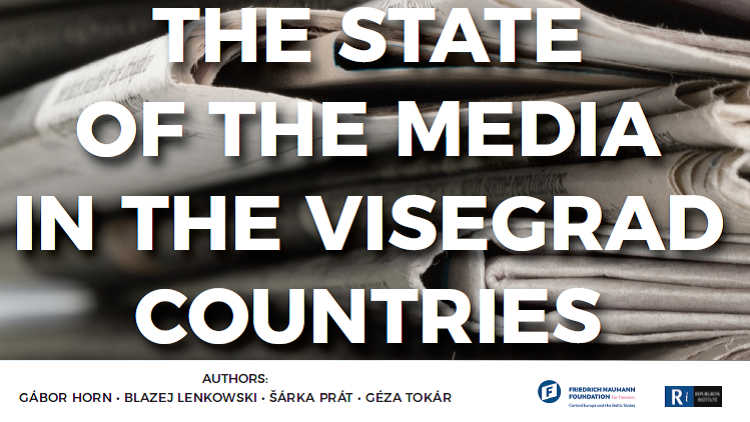Visegrád Group
The State of the Media in the Visegrád Countries

Free press and freedom of speech are among democracy’s essential prerequisites; however, they should not be taken for granted. Published by the Hungarian think tank Republikon Institute, with the support of the Friedrich Naumann Foundation for Freedom, The State of the Media in the Visegrád Countries provides a detailed insight into the media status in Central Europe. Among reflections and opinions, facts, and examples, the fifty-page publication addresses the current health and challenges of the media system in the V4. Particular focus is given to the strengthening of independent media, the relationship between the media and the State, as well as the role of the media in civil society.
In his contribution, Gábor Horn – chairman of the Board at Republikon Foundation –reports on the necessity of media education in the country. Focus is also given to the importance of young generations’ education and digital competence. In his opinion, public media can perform a unique educational function and constitute a forum of public debate in a democracy. However, Horn is worried about how some attempts of manipulating Internet, IT, and new technologies may affect children.
As for Poland, public media are the prey of the ruling right-wing Law and Justice (PiS) party, argues Błażej Lenkowski, President of Fundacja Liberté!, and emphasises how well-functioning public media is important, especially in Poland, where media freedom is shrinking. Growing politicians’ cynicism, their lack of scruples, and arbitrary media manipulations are serious threats to democracy and are carried out by the governing party, writes Lenkowski. The most recent example is the 2020 presidential election, where a mixture of public media manipulation and propaganda favored PiS and its candidate, President Andrzej Duda, against Warsaw’s mayor Rafał Trzaskowski. Lenkowski also reports on how xenophobia, homophobia and Antisemitism have been rehabilitated in Poland as a political tool of the PiS in the public media industry.
Starting from Marshall McLuhan’s famous quote, «The media is the message», Šárka Prát, director of the Institute for Politics and Society in Prague, analyses several media dynamics today: from media polarization to their commercialization, from the problem of the fake news to the damage they create in democracies. Social media play a decisive role in shaping public opinion and the perception of certain events. The issue of media funding is another fundamental aspect of how media have an impact on our societies: between public and private, they are increasingly under attack by political actors. The existence of polarized media «harms democracy in Visegrád countries due to the increased feeling of separation and demonization between the supporters of major political parties», the author warns.
Géza Tokár, a political scientist and doctoral student of ELTE ÁJK, reports on the risks and the state of media in Slovakia, encompassing the 2011-2012 Gorilla Scandal and the murder of journalist Ján Kuciak and his fiancée Martina Kušnírová in 2018. The author describes Slovakia’s instability after 1989 and the troubled relations between its ruling class and the media. Media freedom and journalists are threatened by the intolerance of some parts of the arrogant and sometimes criminal political elite, writes the author. From the governments of Vladimir Mečiar to Mikuláš Dzurinda, Tokár illustrates the ruling class’ attacks on the media and their independence. Tensions between government and press continued to rise during Robert Fico’s governments, where accusations against the media and personal attacks on journalists were the norm, thus increasing the public’s polarization.
Free and independent media are the oxygen of democracy. Media outlets should be able to scrutinize the political classes and the lies of politicians who undermine their role in the society, democracy, and public institutions. As for the citizens, they should practice a responsible media consumption. The quality of the media would attract them more efficiently. Education remains the crucial antidote to political-driven media polarization, institutional decay, and develops a more sensible approach towards freedom of speech and of the press.
You can read the publication The State of the Media in the Visegrád Countries by clicking on this link.
Republikon Institute is a liberal think tank organisation based in Budapest, focusing on analysing Hungarian and international politics, formulating policy recommendations and initiating projects that contribute to a more open, democratic and free society. The goal of the Institute is to promote discussion and implementation of liberal ideas, approaches and policies. Republikon Institute is a member of the 4liberty.eu network.
